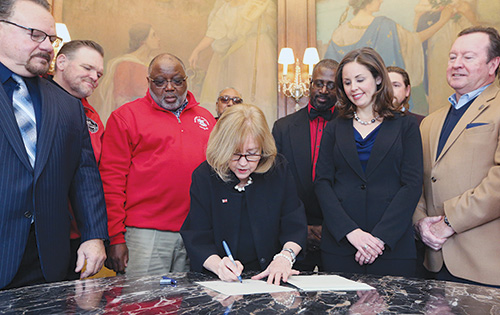By TIM ROWDEN
Editor

Surrounded by union leaders, union contractors and union workers, St. Louis Mayor Lyda Krewson signed legislation last week to ensure skilled workers on large, incentivized construction projects in the City are paid the prevailing wage.
Sponsored by 11th Ward Alderwoman Sarah Wood Martin, the prevailing wage bill is a major win in the city, where tax-incentivized projects like the former Municipal Courts building at 1320 Market St., the Last Hotel, located in the former International Shoe Building at 1501 Washington Ave., (where two non-union workers were killed in 2018) and the now infamous, long-delayed redevelopment of the historic Jefferson Arms building at 415 N. Tucker Blvd., were awarded to unscrupulous developers who brought in, or sought to bring in lower-wage, non-union contractors to get the work done on the cheap.
The legislation, Board Bill 88CSAA, received unanimous approval from the full Board of Aldermen Jan. 31.
“This is a really transformative day for the City of St. Louis and for people who work on our construction projects in the City,” Krewson said. “What this bill does is establishes prevailing wage for all projects in the City of St. Louis that receive almost any subsidy. It’s going to level the playing field for our St. Louis contractors and our St. Louis workers which is, I think, a really important part of this.
 “I know this has been a long time coming,” Krewson said, “and it’s my honor to sign this bill today. Thank you to Alderwoman Martin for working with her colleagues to get this important legislation to my desk. “As a City, we should be doing everything possible to level the playing field for all our hardworking men and women of the trades,” Krewson said. “They more than deserve it.”
“I know this has been a long time coming,” Krewson said, “and it’s my honor to sign this bill today. Thank you to Alderwoman Martin for working with her colleagues to get this important legislation to my desk. “As a City, we should be doing everything possible to level the playing field for all our hardworking men and women of the trades,” Krewson said. “They more than deserve it.”
The new prevailing wage requirements will apply to construction projects worth more than $1 million that receive public development incentives from the City of St. Louis. The new requirements will apply to projects in the City that issue requests for proposals (RFP) or bids, or award contracts, beginning April 7 – or 60 days from the bill’s signing.
 “This is all about giving our local contractors a fair chance,” Alderwoman Martin said. “When the City decides to incentivize projects, we have to make sure our skilled workers are able to bid competitively against someone from outside the region, state, or maybe even the country.
“This is all about giving our local contractors a fair chance,” Alderwoman Martin said. “When the City decides to incentivize projects, we have to make sure our skilled workers are able to bid competitively against someone from outside the region, state, or maybe even the country.
“The city will continue to issue tax incentives, which are an important tool,” Martin said, “but we also want to make sure those investments go back to our workers and contractors.”
In addition to supporting skilled trades workers, including minority and women contractors, the legislation also supports Mayor Krewson’s ongoing commitment to requiring participation by apprentices and City residents in construction projects in the City that receive public development incentives.
‘A HUGE WIN’
Cory Elliott, CEO of CMT (Construction-Management-Technology) LLC, a signatory contractor to Laborers Locals 42 and 110, and Roofers Local 2, said the bill’s passage marks a huge win for union workers and contractors.
“I really, really preach about the trades being an opportunity for everybody who doesn’t necessarily want to go to college, or cannot go to college, to have an actual career, not just a job, and have a living wage,” Elliott said. “This levels the playing field for us as contractors who are union contractors because we have committed to paying that wage and paying benefits at the level that we do, because we can’t outbid a company that’s coming in that isn’t even paying prevailing wage. For us it’s a huge win.”
Brandon Flinn, business manager for the Eastern Missouri Laborers District Council and Laborers Local 42, said the Laborers began pushing for the bill two years ago, around the time that the old Municipal Courts building and Last Hotel projects were awarded.
The effort picked up momentum after two workers were killed falling down an open elevator shaft on the Last Hotel project.
 “This creates a level playing field for our workers and our contractors,” Flinn said. “It means unscrupulous developers and contractors can no longer take advantage of workers or exploit workers on projects that have tax subsidies involved in the City of St. Louis. which is a big deal.”
“This creates a level playing field for our workers and our contractors,” Flinn said. “It means unscrupulous developers and contractors can no longer take advantage of workers or exploit workers on projects that have tax subsidies involved in the City of St. Louis. which is a big deal.”
Laborers Local 110 Government Affairs Director Clint McBride said passage of the bill will benefit more than just union construction workers. “It’s good for the city, too,” he said, “because they’ll be bringing in more money through the earnings tax, so they can do more to help the residents of the city and actually spur more development. This is good for taxpayers and this is good for local contractors and local workers.”
A TEXT-BOOK EXAMPLE
The long-delayed Jefferson Arms project is a textbook example of the benefit of having a prevailing wage ordinance in place for tax-incentivized projects.
Mukemmel “Mike” Sarimsakci, CEO of Alterra International, announced plans to rehab the 13-story, 500,000-square-foot Jefferson Arms building into a Marriott-branded hotel, single-family apartments and ground-level retail in 2016. The proposed $104 million received $20 million in City tax incentives for the project, including $17.4 million in tax-increment financing (TIF) and $2.6 million in special sales tax districts).
City TIF funding requires developers to use at least 25 percent certified minority-owned companies and at least five percent certified women-owned businesses.
Sarimsakci made clear he planned to use a non-union Texas company, paying less than area standard wages and benefits, to handle asbestos abatement work on the project, raising concerns about worker and public safety. Officials from Alterra indicated to City officials that the Texas company would work with a local site demolition firm and that there would be both union and non-union employees used on the project, but was “evasive” on the subject when meeting with union officials in meetings organized by the Mayor’s office.
‘THIS WILL HELP US’
 “This will be a great help for our workers,” said John Stiffler, executive secretary-treasurer of the St. Louis Building & Construction Trades Council. “We won’t have stuff like the Jefferson Arms happening. We have people in this zip code who can do that work and he was going to bring in people from Texas. That’s not right. We have people. We want to get kids off the street with our BUD (Building Union Diversity) program. We have young minorities and women who can do that work.”
“This will be a great help for our workers,” said John Stiffler, executive secretary-treasurer of the St. Louis Building & Construction Trades Council. “We won’t have stuff like the Jefferson Arms happening. We have people in this zip code who can do that work and he was going to bring in people from Texas. That’s not right. We have people. We want to get kids off the street with our BUD (Building Union Diversity) program. We have young minorities and women who can do that work.”
 Pat White, president of the St. Louis Labor Council, said for developers like Sarimsakci “He’s still going to be able bring in the workers that he wants, but they’re going to have to pay the prevailing wage. That’s why people bring in outside workers,” White said, “because they don’t want to pay the prevailing wage. This is going to put our groups on a level playing field. It’s not only going to help us; it’s going to help the contractors and everybody else.”
Pat White, president of the St. Louis Labor Council, said for developers like Sarimsakci “He’s still going to be able bring in the workers that he wants, but they’re going to have to pay the prevailing wage. That’s why people bring in outside workers,” White said, “because they don’t want to pay the prevailing wage. This is going to put our groups on a level playing field. It’s not only going to help us; it’s going to help the contractors and everybody else.”
READ THE BILL
You can read the full text of the City’s prevailing wage legislation at stlouis-mo.gov/government/city-laws/board-bills/boardbill.cfm.


